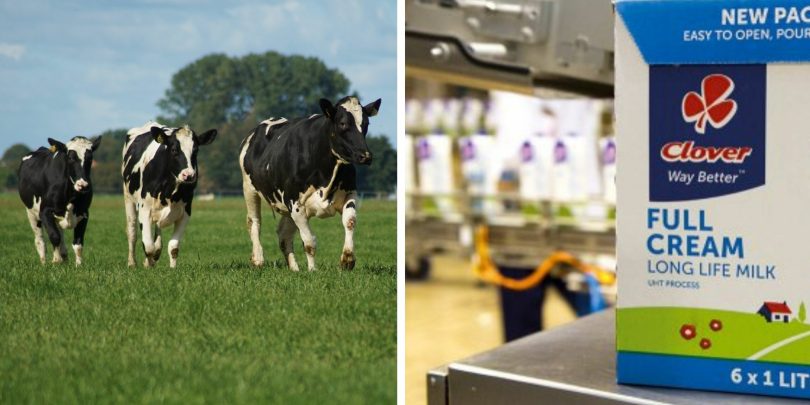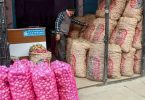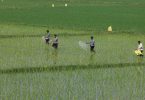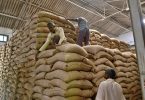[ad_1]
A dairy farmer near Lichtenburg in North West is worried that South Africa’s ongoing battle between Clover and its disgruntled employees could have devastating consequences for small-town communities where agriculture is the main economic driver.
The labour dispute has now entered its eighth week and continues to make national headlines. Strike action is expected to last until workers’ demands are met by Milco SA, a business consortium that owns Clover and is headed by Israel’s Central Bottling Company (CBC).
Workers demand that the company reinstate retrenched staff and those whom they say have been dismissed for striking in October last year in Empangeni. Unions further want disinvestment from CBC, the reversal of the recent 20% salary cuts, and the nationalisation of Clover SA under workers’ control.
Factories to close
The general secretary of the South African Federation of Trade Unions (SAFTU), Zwelinzima Vavi, repeated at the weekend that this year, four Clover factories will have been closed following Milco SA’s takeover of Clover in 2019. SAFTU is among several organisations that have joined picketing action in solidarity with Clover employees belonging to the General Industries Workers’ Union of South Africa (GIWUSA) and Food and Allied Workers Union (FAWU).
News that the country’s biggest cheese factory, Clover’s production plant in Lichtenburg, is up for closure broke last year. Although it was reportedly to move it to KwaZulu-Natal because of service delivery issues in North West, among other factors, unions have since pooled it with Milco SA’s company-wide cost-cutting campaign.
Although information from company headquarters is sparse, Union representatives have also indicated that two more factories in the Free State and one in Gauteng are currently due for decommissioning, while two Western Cape facilities had already been closed in 2020.
“Clover closed… Parow and Milnerton in 2020,” said Vavi. “In its current plan, which is supposed to take effect from March 2022, Clover has planned to close a further four factories: in Frankfort and Heilbron in Free State, Lichtenburg in North West, and City Deep in Gauteng.”
Devastating effect on farmers
According to Calla Botha, a dairy farmer in Ottosdal near Lichtenburg, the factory’s imminent closure has already had unintended consequences for dairy farmers that supply the plant.
“Personally, I have already decided to close my dairy business. I have a buyer who will come to take all my animals within two weeks. And it’s not just me; there are a lot of farmers who are going to do it. Recently, another farmer slaughtered all his cows,” he tells Food For Mzansi.
Workers, employed by these dairy farms, have also felt the pinch. “It’s already affecting the community with job losses. With me, there is going to be a job loss of about nine workers. This was not planned or deliberate; it was forced.”
But Botha says that Clover’s decision to close the plant is only partly to blame for their woes. “Feed is expensive as well as labour. On top of that there’s transportation costs. If you are far from the buyer, you get less for your product because of the amount of travelling involved.”
Another dairy farmer near Lichtenburg, Johan van Niekerk in Delareyville, tells Food For Mzansi that he is deeply concerned about the impact of possible factory closures on jobs and farmers in affected small towns.
After milking for over 40 years and supplying Clover, among other buyers, Van Niekerk says he is ready to throw in the towel.

“[News of] the closure of the factory was devastating and has had a negative impact in the small towns, in which agriculture is the main economic driver.
“I am concerned about all the workers who have lost their jobs, and in instances where some dairy farmers [who] are still operational, might lose their jobs in the near future.”
After four decades of waking up as early as 03:30 every day to milk his cows, Van Niekerk now finds himself in a place of uncertainty. “It’s sad to let go of workers who have been working hard for years. We are not making money that will enable us to carry on milking,” he says.
With his biggest client leaving the area, he has doubts that he’ll be able to continue with his dairy operation. “My workers are good people. I have not released any workers. But it is not the same with other farmers who were solely relying on Clover. They do not have a choice but to let them go.”
‘Broken promises’ by dairy giant
Strike action, which started in November 2021, has escalated in the past few days with striking Clover workers and their representative unions having met with trade and industry minister Ebrahim Patel on Sunday, 16 January 2022. The meeting was arranged in a bid to get the minister’s backing in stopping factory closures and job losses.
Unions want Patel to reverse the merger between Clover and Milco as unions believe the company has not kept itself to competition-related conditions to its merger.
Back in 2019, the purchase of Clover by Milco was heavily scrutinised by the Competition Commission and Competition Tribunal because of the deal’s potential to affect competition dynamics in Mzansi’ dairy industry, the Daily Maverick reports. One of the conditions for the merger to go ahead, was that there would be no retrenchments at Clover for at least three years.
“I will now have an opportunity to evaluate [this],” Patel told eNCA on Sunday after meeting with Clover workers and their union representatives. “The matter has been referred to the Competition Commission for investigation. Of course, it is important for us to make every effort to try and save jobs and to keep industrial capability in South Africa.”
Relook ‘unreasonable demands’
The Milk Producers Organisation (MPO) has cautioned unions about the long-term effects that a prolonged strike at Clover might have on the industry and jobs.

The chairperson of the organisation, Colin Wellbeloved, says it is time for both parties to meet each other halfway, adding that “unreasonable demands” need to be relooked for the benefit of everyone involved. He hopes that leaders of the two parties could negotiate in good faith to bring an end to the strike.
“Continued industrial action over unreasonable demands such as nationalisation of Clover will only result in bigger financial losses for both parties and will most likely put even more jobs at risk. We are concerned about the negative impact that this strike is having on our industry.
“That said, our contingency plans are working well.”
Wellbeloved says he was pleased that, despite the longevity of the strike, Clover had agreed to pay December bonuses to its workers.
Another positive, he points out, is that there seems not to have been much interruption of dairy supplies to retail stores, even under difficult circumstances.
Spillover into retail stores
In the meantime striking workers have gained the support of some consumers and human rights organisations in South Africa. In Observatory, Cape Town, protesters have stormed into a Pick n Pay supermarket last week, taking Clover products off the shelves.
GIWUSA president Mamotlhwe Sebei has further urged people in South Africa to boycott Clover products in solidarity with the striking workers.
ALSO READ: Closure of four Clover factories imminent – unions
Sign up for Mzansi Today: Your daily take on the news and happenings from the agriculture value chain.
[ad_2]
Source link







